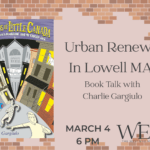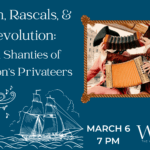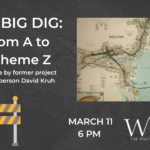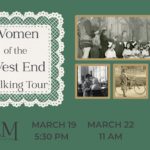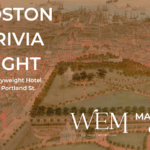Jewish Heritage Month Honoree Night
The West End Museum is proud to mark Jewish Heritage Month by honoring three outstanding West Enders of Jewish descent: Arthur Geller, Harry “Buddo” Greenberg and Hyman Rosenberg.
Arthur Geller [born 1932] Arthur Geller lived in the West End from his birth until 1951, when his parents fulfilled their dream of buying a home and moved the family to Dorchester. Throughout his time in the West End, Arthur was very active with the West End House. As a boy, he participated in basketball, cross country, track and declamation programs there. At the West End House Camp, he progressed from camper to counselor to co-director. Geller was also associated with the Elizabeth Peabody House and Burroughs Newsboys Foundation. He attended the Peter Faneuil and Blackstone Schools, then English High School and Suffolk University. He served in the US Army from 1955-1957, largely in Japan. Geller’s sense of community remains to this day as evidenced by his work with various Boys Clubs and Neighborhood Youth Corps. He has contributed to preserving the history and culture of his old neighborhood by facilitating the transfer of West End House artifacts—such as trophies, awards and important papers—to the West End Museum archives.
Harry “Buddo” Greenberg [1910-1997] Born in the West End, Harry “Buddo” Greenberg lived there until he was forced to leave in 1957. Best known for his basketball officiating career, he first refereed at West End House basketball games, where he also coached and was a trusted mentor to hundreds of young men, including Leonard Nimoy. Buddo went on to work high school and college games, travel with the Harlem Globetrotters and ultimately become a ref in the Basketball Association of America (later the NBA). A creative and critical thinker, he is credited with the development and implementation of the 24-second clock. At his testimonial retirement dinner, Red Auerbach said he’d rather have Buddo Greenberg sitting on the sidelines refereeing his games than any of the other referees running up and down the court. With an unshakable moral compass and high principles, he was a friend and confidant to many within and outside of basketball, including Auerbach, Tip O’Neil, Walter Brown, Bob Cousy, Ted Williams and Johnny Pesky.
The Boston Celtics sent an official letter recognizing Buddo’s contributions to the sport and his close relationship with the team. “We congratulate Mr. Greenberg’s family on this honor,” said Jeff Twiss, Celtics VP of Media Services/Alumni Relations. “He was a very dear friend of Walter Brown, our founder and original owner. And, when Mr. Brown passed, that friendship carried over to Red Auerbach. Those special bonds were built on a sincere mutual respect and a lifelong love of basketball.”
Hyman Rosenberg [1913 – 2009] Born in Chelsea, Hyman Rosenberg became a West Ender with his family around 1920. He lived there until demolition and returned to the neighborhood in the 1990s. Rosenberg worked as a house painter until World War II. Ineligible for military service, he worked at the Boston Shipyard. He returned to house-painting after the war and later worked in the maintenance department at Children’s Hospital. In his boyhood, Rosenberg was very active with the West End house, particularly in track and field. Rosenberg also coordinated stats for the House’s intramural sports leagues, helped create its Westy News—including a service edition with news of members and alumni serving overseas—and participated in the Alumni Association. Two other passions were boxing and ballroom dancing. He became a well-respected amateur boxing historian and took part in ballroom dances for decades. His personal papers, now part of the museum archives, preserve significant portions of West End history and include his brother Archie’s letters during wartime, his mother Bessie’s accounts of Jewish organizations before 1960, dozens of ballroom dance programs and Rosenberg’s own business records



